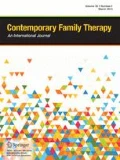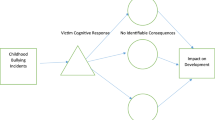Abstract
Among adults, childhood maltreatment is widely known to increase depressive symptoms and reduce quality of adult’s intimate relationships. Considering the association between childhood maltreatment and adult depression and relationship quality from systemic theories may help clinicians conceptualize and intervene with their clients. Internal Family Systems is an evidenced based psychotherapy and is a trauma-informed model. Self is one of the core concepts of the Internal Family Systems model and it is theorized to reduce mental health problems such as depression and strengthen adult romantic relationships. Despite this theoretical proposition there is no supporting empirical research. To address this gap, the current study examined Self, specifically the qualities of Self (e.g., compassion) and Self-Leadership (e.g., staying calm in face of distress) as pathways linking childhood maltreatment to depression and relationship quality. Using a sample of adults in a romantic relationship, the current study examined Self-Qualities and Self-Leadership as mediators linking retrospective reports of child maltreatment to current depressive symptoms and relationship quality. Results indicate that the indirect (mediating) effects from childhood maltreatment to depressive symptoms and relationship quality were significant through Self-Qualities, but not Self-Leadership. Findings suggest that childhood maltreatment is associated with less frequent access to the qualities of Self, such as compassion and confidence which, in turn, were associated with fewer depressive symptoms and higher levels of relationship quality. For clinicians, the use of IFS and specifically helping clients increase the Self-Qualities may reduce depressive symptoms and strengthen romantic relationships.
Similar content being viewed by others
References
Anderson, F. G., Sweezy, M., & Schwartz, R. D. (2017). Internal family systems skills training manual: trauma-informed treatment for anxiety, depression, PTSD & substance abuse. PESI Publishing & Media.
Andrews, B., & Wilding, J. M. (2004). The relation of depression and anxiety to life-stress and achievement in students. British Journal of Psychology, 95, 509–521. https://doi.org/10.1348/0007126042369802.
Bernstein, D. P., Stein, J. A., Newcomb, M. D., Walker, E., Pogge, D., Ahluvalia, T., ... & Zule, W. (2003). Development and validation of a brief screening version of the Childhood Trauma Questionnaire. Child Abuse & Neglect, 27(2), 169–190. https://doi.org/10.1016/S0145-2134(02)00541-0.
Björgvinsson, T., Kertz, S. J., Bigda-Peyton, J. S., McCoy, K. L., & Aderka, I. M. (2013). Psychometric properties of the CES-D-10 in a psychiatric sample. Assessment, 20, 429–436. https://doi.org/10.1177/1073191113481998.
Bolduc, R., Bigras, N., Daspe, M. È., Hébert, M., & Godbout, N. (2018). Childhood cumulative trauma and depressive symptoms in adulthood: The role of mindfulness and dissociation. Mindfulness, 9, 1594–1603. https://doi.org/10.1007/s12671-018-0906-3.
Bradbury, L. L., & Shaffer, A. (2012). Emotion dysregulation mediates the link between childhood emotional maltreatment and young adult romantic relationship satisfaction. Journal of Aggression, Maltreatment & Trauma, 21, 497–515. https://doi.org/10.1080/10926771.2012.678466.
Braithwaite, S. R., Delevi, R., & Fincham, F. D. (2010). Romantic relationships and the physical and mental health of college students. Personal Relationships, 17, 1–12. https://doi.org/10.1111/j.1475-6811.2010.01248.x.
Brown, K. W., & Ryan, R. M. (2003). The benefits of being present: Mindfulness and its role in psychological well-being. Journal of Personality and Social Psychology, 84, 822–848. https://doi.org/10.1037/0022-3514.84.4.822.
Burns, E. E., Jackson, J. L., & Harding, H. G. (2010). Child maltreatment, emotion regulation, and posttraumatic stress: The impact of emotional abuse. Journal of Aggression, Maltreatment & Trauma, 19, 801–819. https://doi.org/10.1080/10926771.2010.522947.
Carson, J. W., Carson, K. M., Gil, K. M., & Baucom, D. H. (2004). Mindfulness-based relationship enhancement. Behavior Therapy, 35, 471–494. https://doi.org/10.1016/S0005-7894(04)80028-5.
Chapman, D. P., Whitfield, C. L., Felitti, V. J., Dube, S. R., Edwards, V. J., & Anda, R. F. (2004). Adverse childhood experiences and the risk of depressive disorders in adulthood. Journal of Affective Disorders, 82(2), 217–225. https://doi.org/10.1016/j.jad.2003.12.013.
Coates, A. A., & Messman-Moore, T. L. (2014). A structural model of mechanisms predicting depressive symptoms in women following childhood psychological maltreatment. Child Abuse & Neglect, 38, 103–113. https://doi.org/10.1016/j.chiabu.2013.10.005.
DeLand, L. F., Strongin, D. L., & Schwartz, R. C. (2004). The development of a personality scale based on the internal family systems model. Journal of Self Leadership, 2, 1–14.
Demir, M. (2008). Sweetheart, you really make me happy: Romantic relationship quality and personality as predictors of happiness among emerging adults. Journal of Happiness Studies, 9(2), 257–277. https://doi.org/10.1007/s10902-007-9051-8.
DiLillo, D., Lewis, T., & Loreto-Colgan, A. D. (2007). Child maltreatment history and subsequent romantic relationships: Exploring a psychological route to dyadic difficulties. Journal of Aggression, Maltreatment & Trauma, 15(1). 19–36. https://doi.org/10.1300/J146v15n01_02.
DiLillo, D., Peugh, J., Walsh, K., Panuzio, J., Trask, E., & Evans, S. (2009). Child maltreatment history among newlywed couples: A longitudinal study of marital outcomes and mediating pathways. Journal of Consulting and Clinical Psychology, 77(4), 680–692. https://doi.org/10.1037/a0015708.
Dolbier, C. L., Soderstrom, M., & Steinhardt, M. A. (2001). The relationships between self-leadership and enhanced psychological, health, and work outcomes. The Journal of Psychology, 135, 469–485. https://doi.org/10.1080/00223980109603713.
Esmaeelzadeh, S., Moraros, J., Thorpe, L., & Bird, Y. (2018). The association between depression, anxiety and substance use among Canadian post-secondary students. Neuropsychiatric Disease and Treatment, 14, 3241. https://doi.org/10.2147/NDT.S187419.
Essau, C. A., Lewinsohn, P. M., Lim, J. X., Moon-ho, R. H., & Rohde, P. (2018). Incidence, recurrence and comorbidity of anxiety disorders in four major developmental stages. Journal of Affective Disorders, 228, 248–253. https://doi.org/10.1016/j.jad.2017.12.014.
Funk, J. L., & Rogge, R. D. (2007). Testing the ruler with item response theory: Increasing precision of measurement for relationship satisfaction with the Couples Satisfaction Index. Journal of Family Psychology, 21(4), 572–583. https://doi.org/10.1037/0893-3200.21.4.572.
Gibb, B. E., Alloy, L. B., Abramson, L. Y., Rose, D. T., Whitehouse, W. G., Donovan, P., … Tierney, S. (2001). History of childhood maltreatment, negative cognitive styles, and episodes of depression in adulthood. Cognitive Therapy and Research, 25, 425–446. https://doi.org/10.1023/A:1005586519986.
Godbout, N., Dutton, D. G., Lussier, Y., & Sabourin, S. (2009). Early exposure to violence, domestic violence, attachment representations, and marital adjustment. Personal Relationships, 16(3), 365–384. https://doi.org/10.1111/j.1475-6811.2009.01228.x.
Goff, B. S. N., Reisbig, A. M., Bole, A., Scheer, T., Hayes, E., Archuleta, K. L., ... & Smith, D. B. (2006). The effects of trauma on intimate relationships: A qualitative study with clinical couples. American Journal of Orthopsychiatry, 76(4), 451–460. https://doi.org/10.1037/0002-9432.76.4.451.
Haber, R. (2002). Virginia Satir: An integrated, humanistic approach. Contemporary Family Therapy, 24, 23–34. https://doi.org/10.1023/A:1014317420921.
Haddock, S. A., Weiler, L. M., Trump, L. J., & Henry, K. L. (2017). The efficacy of internal family systems therapy in the treatment of depression among female college students: A pilot study. Journal of Marital and Family Therapy, 43, 131–144. https://doi.org/10.1111/jmft.12184.
Hayes, A. F. (2009). Beyond Baron and Kenny: Statistical mediation analysis in the new millennium. Communication Monographs, 76, 408–420. https://doi.org/10.1080/03637750903310360.
Hayes, A. F., Montoya, A. K., & Rockwood, N. J. (2017). The analysis of mechanisms and their contingencies: PROCESS versus structural equation modeling. Australasian Marketing Journal (AMJ), 25(1), 76–81. https://doi.org/10.1016/j.ausmj.2017.02.001.
Herbine-Blank, T., Kerpelman, D. M., & Sweezy, M. (2015). Intimacy from the inside out: Courage and compassion in couple therapy. Routledge.
Ibrahim, A. K., Kelly, S. J., Adams, C. E., & Glazebrook, C. (2013). A systematic review of studies of depression prevalence in university students. Journal of Psychiatric Research, 47, 391–400. https://doi.org/10.1016/j.jpsychires.2012.11.015.
Internal Family Systems Institute. (2021). Internal Family Systems (IFS) Treatment for PTSD and Comorbid Conditions: A Pilot Study. https://ifs-institute.com/resources/research/internal-family-systems-ifs-treatment-ptsd-and-comorbid-conditions-pilot-study.
Jovanovic, V., & Brdaric, D. (2012). Did curiosity kill the cat? Evidence from subjective well-being in adolescents. Personality and Individual Differences, 52, 380–384. https://doi.org/10.1016/j.paid.2011.10.043.
Kalill, K. S., Treanor, M., & Roemer, L. (2014). The importance of non-reactivity to posttraumatic stress symptoms: A case for mindfulness. Mindfulness, 5(3), 314–321.
Kessler, R. C., Petukhova, M., Sampson, N. A., Zaslavsky, A. M., & Wittchen, H. U. (2012). Twelve-month and lifetime prevalence and lifetime morbid risk of anxiety and mood disorders in the United States. International Journal of Methods in Psychiatric Research, 21, 169–184. https://doi.org/10.1002/mpr.1359.
Kozlowski, A. (2013). Mindful mating: Exploring the connection between mindfulness and relationship satisfaction. Sexual and Relationship Therapy, 28, 92–104. https://doi.org/10.1080/14681994.2012.748889.
Lehrer, J. A., Buka, S., Gortmaker, S., & Shrier, L. A. (2006). Depressive symptomatology as a predictor of exposure to intimate partner violence among US female adolescents and young adults. Archives of Pediatrics & Adolescent Medicine, 160, 270–276. https://doi.org/10.1001/archpedi.160.3.270.
McGill, J., Adler-Baeder, F., & Rodriguez, P. (2016). Mindfully in love: A meta-analysis of the association between mindfulness and relationship satisfaction. Journal of Human Sciences and Extension, 4, 89–101.
McGill, J. M., Burke, L. K., & Adler-Baeder, F. (2020). The dyadic influences of mindfulness on relationship functioning. Journal of Social and Personal Relationships. https://doi.org/10.1177/0265407520944243.
Nanni, V., Uher, R., & Danese, A. (2012). Childhood maltreatment predicts unfavorable course of illness and treatment outcome in depression: A meta-analysis. American Journal of Psychiatry, 169, 141–151. https://doi.org/10.1176/appi.ajp.2011.11020335.
Nasim, R., & Nadan, Y. (2013). Couples therapy with childhood sexual abuse survivors (CSA) and their partners: Establishing a context for witnessing. Family process, 52(3), 368–377. https://doi.org/10.1111/famp.12026.
Neff, K. D., & Beretvas, S. N. (2013). The role of self-compassion in romantic relationships. Self and Identity, 12, 78–98. https://doi.org/10.1080/15298868.2011.639548.
Neff, K. D., & McGehee, P. (2010). Self-compassion and psychological resilience among adolescents and young adults. Self and Identity, 9, 225–240. https://doi.org/10.1080/15298860902979307.
Nelson, J., Klumparendt, A., Doebler, P., & Ehring, T. (2017). Childhood maltreatment and characteristics of adult depression: Meta-analysis. The British Journal of Psychiatry, 210, 96–104. https://doi.org/10.1192/bjp.bp.115.180752.
Paradis, A., & Boucher, S. (2010). Child maltreatment history and interpersonal problems in adult couple relationships. Journal of Aggression, Maltreatment & Trauma, 19(2), 138–158. https://doi.org/10.1080/10926770903539433.
Ross, N. D., Kaminski, P. L., & Herrington, R. (2019). From childhood emotional maltreatment to depressive symptoms in adulthood: The roles of self-compassion and shame. Child Abuse & Neglect, 92, 32–42. https://doi.org/10.1016/j.chiabu.2019.03.016.
Schwartz, R. C. (2008). You are the one you’ve been waiting for: Bringing courageous love to intimate relationships. Trailheads.
Schwartz, R. C., & Sweezy, M. (2019). Internal family systems therapy. Guilford Publications.
Shadick, N. A., Sowell, N. F., Frits, M. L., Hoffman, S. M., Hartz, S. A., Booth, F. D., … Friedman, A. L. (2013). A randomized controlled trial of an internal family systems-based psychotherapeutic intervention on outcomes in rheumatoid arthritis: A proof-of concept study. The Journal of Rheumatology, 40, 1831–1841. https://doi.org/10.3899/jrheum.121465.
Spitzer, R. L., Kroenke, K., Williams, J. B., & Löwe, B. (2006). A brief measure for assessing generalized anxiety disorder: The GAD-7. Archives of Internal Medicine, 166, 1092–1097. https://doi.org/10.1001/archinte.166.10.1092.
Steinhardt, M., Dolbier, C., Mallon, M., & Adams, T. (2003). The development and validation of a scale for measuring self-leadership. Journal of Self-Leadership, 1, 20–31.
Taillieu, T. L., Brownridge, D. A., Sareen, J., & Afifi, T. O. (2016). Childhood emotional maltreatment and mental disorders: Results from a nationally representative adult sample from the United States. Child Abuse & Neglect, 59, 1–12. https://doi.org/10.1016/j.chiabu.2016.07.005.
Tanaka, M., Wekerle, C., Schmuck, M. L., Paglia-Boak, A., & MAP Research Team. (2011). The linkages among childhood maltreatment, adolescent mental health, and self-compassion in child welfare adolescents. Child Abuse & Neglect, 35(10), 887–898. https://doi.org/10.1016/j.chiabu.2011.07.003.
Victor, S. E., & Klonsky, E. D. (2016). Validation of a brief version of the difficulties in emotion regulation scale (DERS-18) in five samples. Journal of Psychopathology and Behavioral Assessment, 38, 582–589. https://doi.org/10.1016/j.janxdis.2014.03.002.
Whisman, M. A. (2006). Childhood trauma and marital outcomes in adulthood. Personal Relationships, 13(4), 375–386. https://doi.org/10.1111/j.1475-6811.2006.00124.x.
Wilkins, E. J. (2007). Using an IFS informed intervention to treat African American families surviving sexual abuse: One family's story. Journal of Feminist Family Therapy: An International Forum, 19(3), 37–53. https://doi.org/10.1300/J086v19n03_03.
Wu, Q., Chi, P., Lin, X., & Du, H. (2018). Child maltreatment and adult depressive symptoms: Roles of self-compassion and gratitude. Child Abuse & Neglect, 80, 62–69. https://doi.org/10.1016/j.chiabu.2018.03.013.
Acknowledgements
We would like to acknowledge Lia Deland for her helpful comments on the prior draft of this manuscript
Funding
None.
Author information
Authors and Affiliations
Corresponding author
Ethics declarations
Conflict of interest
The authors declare no conflicts of interest in the publication of the current manuscript.
Ethical Approval
The project was conducted in accordance with ethical standards and was approved by the first author’s institutional review board.
Informed Consent
All participants completed an informed consent prior to data collection.
Additional information
Publisher's Note
Springer Nature remains neutral with regard to jurisdictional claims in published maps and institutional affiliations.
Rights and permissions
About this article
Cite this article
Fitzgerald, M., Barton, C. Self-Qualities and Self-Leadership as Pathways Linking Childhood Maltreatment to Depression and Relationship Quality. Contemp Fam Ther 44, 156–166 (2022). https://doi.org/10.1007/s10591-021-09577-7
Accepted:
Published:
Issue Date:
DOI: https://doi.org/10.1007/s10591-021-09577-7




